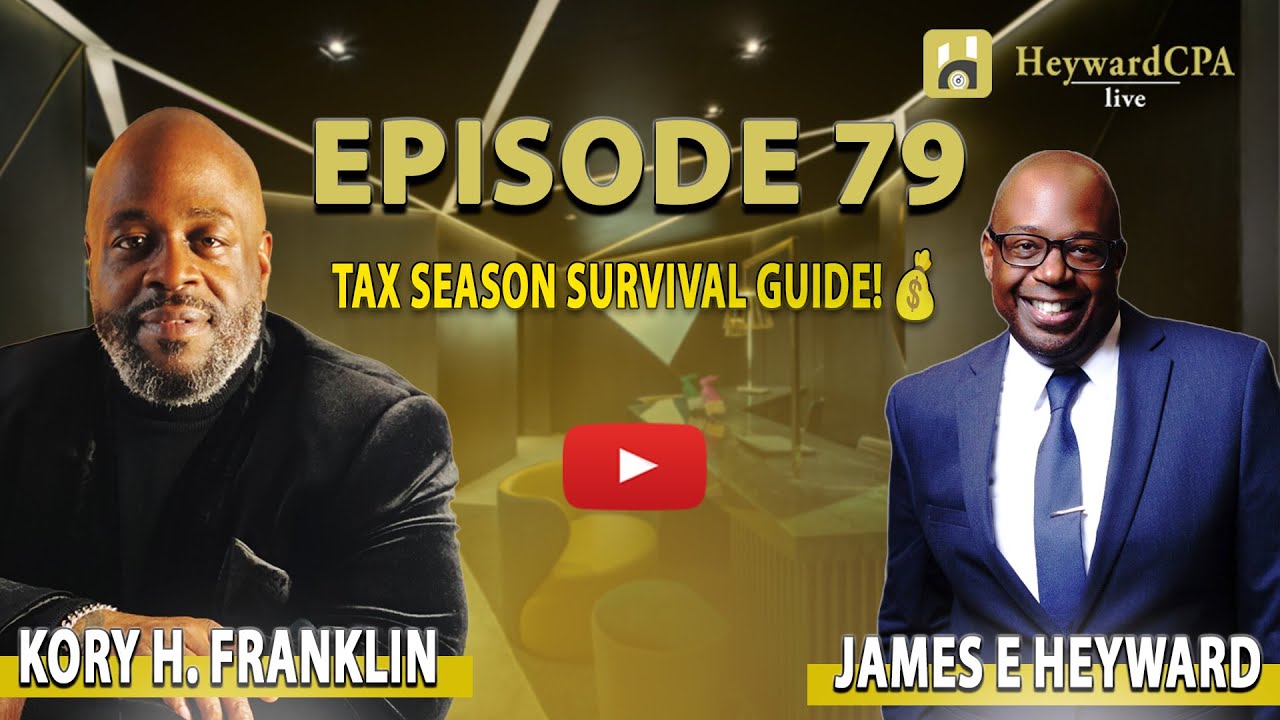Last Updated on 5 months ago by Heyward CPA PLLC

Tax season is upon us, and with it comes the annual rush to gather documents, file returns, and make sense of personal finances. In the latest episode of Heyward CPA Live, hosts James E. Heyward and Kory H. Franklin bring their expert accounting perspective to the table, demystifying taxes and personal finance for individuals and business owners alike. This blog post distills their engaging discussion into actionable advice and valuable insights to help you navigate tax season with confidence and clarity.
Introduction to Tax Season 2025: What You Need to Know
As we prepare to file 2024 tax returns, it’s crucial to understand that tax season is not just a deadline but an opportunity to get informed and plan strategically. The Heyward CPA team emphasizes that tax preparation isn’t merely about crunching numbers; it’s about tax advising with a vision that aligns with your financial goals.
Gathering your tax documents—from employer forms, mortgage statements, investment records, to receipts—is the first step. However, not every scrap of paper is necessary; experienced practitioners know which documents are essential to ensure an efficient and accurate filing process.
To streamline this, Heyward CPA provides clients with digital organizers, allowing easy submission of required information and reducing stress around tax preparation. This system reflects their commitment to making the tax experience as seamless as possible.
Breaking Down Tax Anxiety: Understanding the System
One of the most striking points made by the hosts is the widespread anxiety people feel about taxes. This fear often stems from a disconnect—many only pay attention to taxes during filing season, rather than staying engaged year-round. Taxes are an integral part of the financial game, not an adversarial force.
“The IRS collects money based on laws passed by Congress. It’s like blaming the dog for biting when you trained it to bite.”
Despite the myths and fears, the Internal Revenue Service is simply an agent executing the laws set by elected officials. Understanding this helps reframe the conversation from “us versus them” to a more practical, informed approach to managing your tax obligations.
Key Tax Concepts to Keep in Mind
Tax Liability vs. Refunds
It’s important to differentiate between your tax liability—the actual amount of tax you owe—and what you might receive as a refund. A refund occurs when you’ve paid more throughout the year than your tax liability requires. For business owners, especially those new to entrepreneurship, refunds are less common unless estimated payments have been made.
Effective Tax Rate Explained
The effective tax rate is the percentage of your income that you actually pay in taxes, which differs from the marginal tax bracket often discussed. For example, if your highest tax bracket is 25%, it only applies to the top portion of your income, not the entirety.
Income Types and Tax Rates
The discussion highlights how different types of income are taxed differently. Wage earners face higher tax rates on their earnings compared to individuals who receive income through dividends, interest, or capital gains, which are typically taxed at lower rates (around 20%).
“Warren Buffett pays a lower tax rate than his secretary because most of his income is from dividends taxed at a lower rate.”
Why Professional Tax Advice Matters
Taxes are complex and ever-changing. No practitioner can claim to know everything, but working with knowledgeable advisors like those at Heyward CPA can help identify favorable deductions, navigate tax laws, and optimize your financial outcomes. The goal is to file accurately, take full advantage of legitimate deductions, and plan effectively to avoid surprises.
Repeatedly calling your tax preparer won’t speed up the process; instead, gathering your documents early and communicating clearly will. Heyward CPA’s organized system is designed to reduce client anxiety and improve efficiency.
Building Financial Literacy Through Continuous Learning
Beyond tax season, the hosts stress the importance of continuous financial education. They share about their family book club experience, focusing on books related to finance and personal growth. Engaging with such material encourages critical thinking and challenges limiting beliefs, which is essential for long-term financial success.
James shares insights from the book “Make Your Bed” by Admiral William H. McRaven, which underscores how small daily habits can lead to significant impact. This philosophy extends to financial habits and mindset—small, consistent actions build resilience and pave the way for comebacks after setbacks.
Practical Tips to Master Your Taxes and Personal Finances
- Gather all relevant tax documents early, but avoid overwhelming your preparer with unnecessary paperwork.
- Understand your total tax liability, not just what you owe or get refunded.
- Stay engaged with your tax situation year-round to avoid surprises and plan better.
- Consider working with a tax professional who provides advisory services alongside tax preparation.
- Develop financial literacy through reading and discussion to sharpen your decision-making skills.
- Build habits that foster discipline and resilience—both in life and finances.
Conclusion: Take Control of Your Tax Season and Financial Future
Taxes can feel daunting, but with the right mindset, tools, and professional support, you can transform tax season from a source of stress into an opportunity for empowerment. Staying informed, organized, and proactive is key. Remember, taxes are just one part of your financial story. By mastering them, you set the stage for greater financial stability and growth.
For personalized assistance, consider reaching out to trusted advisors who can guide you through the complexities of tax compliance and strategic planning. As James and Kory remind us, your financial journey is about more than just numbers—it’s about vision, knowledge, and taking deliberate steps toward your goals.
Ready to master your taxes and personal finance? Start today by understanding your tax return, organizing your documents, and seeking expert advice tailored to your unique situation.
